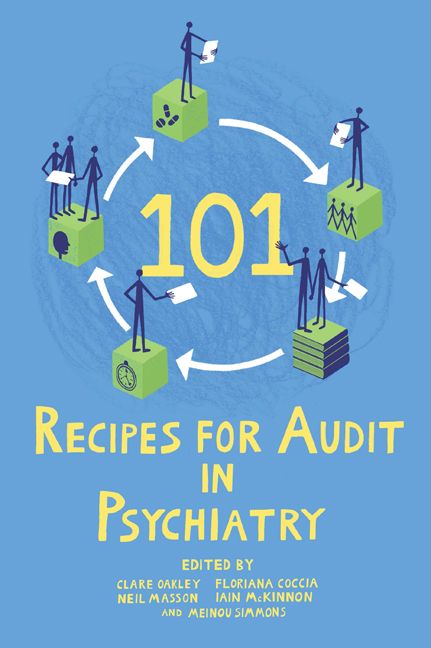V - Service provision
Summary
Setting
This audit will be relevant to all psychiatrists, though those working in and with services for early intervention in psychosis (EI) will find it especially useful.
Background
EI is a key component of modern mental health services in England (Department of Health, 2000). It involves the specialist support of people with first-episode psychosis aged 14–35 years and their families and comprises three concepts: the early detection of psychosis; a reduction in the duration of untreated psychosis; the importance of the first 3–5 years following onset (the critical period) for later biological, psychological and social outcomes.
Standards
The Mental Health Policy Implementation Guide (PIG) (Department of Health, 2001) provides a model for EI. On the basis of this model, the Department of Health specified eight minimum fidelity criteria against which providers could self-assess local EI services. These were expanded to give ten standards against which services were assessed in this audit:
▸ stand-alone service model
▸ dedicated consultant psychiatrist input
▸ full age range (14–35 years)
▸ care provided for up to 3 years
▸ assertive community outreach work
▸ extended opening hours
▸ case-loads of 10–15 per care coordinator
▸ adolescent provision
▸ primary care referral
▸ designated access to acute beds.
These criteria are included in the Department of Health's autumn assessment local delivery plan (LDP) returns (see also Tiffin & Glover, 2007).
Method
Data collection
Service managers within EI teams should ensure there is a system in place to document minimum data on all patients under their care and that operational descriptors accurately describe the service model. Information on patient age, referral source and interventions received were obtained from patient case files. Service managers should therefore be able to provide the data required within the audit ‘window’. A bespoke tool was used in the present audit, but an EI audit pro forma is available online as part of the LDP autumn assessment to assist efficiency of data collection and analysis (http://www.ic.nhs.uk/services/ mental-health/mental-health-minimum-dataset-mhmds).
- Type
- Chapter
- Information
- 101 Recipes for Audit in Psychiatry , pp. 133 - 164Publisher: Royal College of PsychiatristsFirst published in: 2017



